|
|
|
Sort Order |
|
|
|
Items / Page
|
|
|
|
|
|
|
| Srl | Item |
| 1 |
ID:
184199
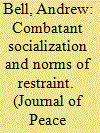

|
|
|
|
|
| Summary/Abstract |
Can armed groups socialize combatants to norms of restraint – in essence, train soldiers to adopt norms of international humanitarian law on the battlefield? How can social scientists accurately measure such socialization? Despite being the central focus of organizational and ideational theories of conflict, studies to date have not engaged in systematic, survey-based examination of this central socialization mechanism theorized to influence military conduct.
This study advances scholarly understanding by providing the first comparative, survey-based examination of combatant socialization to norms of restraint, using surveys and interviews with US Army cadets at the US Military Academy (USMA), Army Reserve Officer Training Corps (ROTC), and active duty Army combatants. Additionally, to better understand ‘restraint’ from combatants’ perspective, this study introduces the concept of the ‘combatant’s trilemma’ under which combatants conceptualize civilian protection as part of a costly trade-off with the values of military advantage and force protection.
Survey results hold both positive and negative implications for socialization to law of war norms: military socialization can shift combatants’ preferences for battlefield conduct. However, intensive norm socialization may be required to shift combatants’ preferences from force protection to civilian protection norms. Study findings hold significant implications for understanding violence against civilians in conflict and for policies to disseminate civilian protection norms in armed groups worldwide.
|
|
|
|
|
|
|
|
|
|
|
|
|
|
|
|
| 2 |
ID:
184198
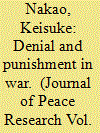

|
|
|
|
|
| Summary/Abstract |
Formal models of war termination have been developed along two major approaches: in one, war is interpreted as a series of battles, where nations exchange denials that aim to destroy enemy forces; in the other, war is illustrated as a process of bargaining with mutual punishments that inflict costs on opponents. By integrating these two approaches, I build a dynamic model of war, where two nations choose between military force and civilian value as the targets of their attacks in every battle. The war proceeds along one of the following three paths in equilibrium. First, either nation immediately gives in to the other’s threat of punishment such as nuclear strikes. Second, both the nations continue to conduct counterforce denial campaigns to weaken each other until either side is fully disarmed (i.e. all-out war). Third, after significant military imbalance is generated by the exchange of denials in an early battle, the winner of the battle switches to a countervalue punishment campaign, to which the loser responds by capitulation (i.e. limited war). My equilibrium analyses suggest that while denials largely determine a war’s outcome, punishments can influence its duration. Unlike existing models, mine illuminates the two-way causal relationship, where past battle outcomes can influence the choice of military strategy, whereas military strategies also shape how the war will further evolve.
|
|
|
|
|
|
|
|
|
|
|
|
|
|
|
|
| 3 |
ID:
184197
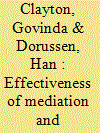

|
|
|
|
|
| Summary/Abstract |
Mediation and peacekeeping are commonly used tools to manage conflict. To what extent are they complementary and effective instruments for ending violent conflicts? Generally, they are seen as distinct tools: mediation aims to facilitate negotiated settlements, while the goal of peacekeeping is to prevent agreements from collapsing. However, peacekeeping and mediation regularly occur simultaneously. Arguably, peacekeeping operations rely on continuing political processes, while peacekeepers create a context favorable for mediation and provide a valuable source of independent information. Using a variety of model specifications, including selection models, empirical evidence supports that (a) mediation rather than peacekeeping is key to halting hostilities, (b) mediation and peacekeeping are largely complementary, but (c) this complementarity is conditional: in the post-Cold War period, transformative peacekeeping boosted the effectiveness of mediation to halt civil wars. There is no evidence that peacekeeping on its own matters for ending conflict. Finally, counterfactual analysis shows the substantial impact of mediation and peacekeeping on the frequency of conflict.
|
|
|
|
|
|
|
|
|
|
|
|
|
|
|
|
| 4 |
ID:
184202


|
|
|
|
|
| Summary/Abstract |
Militant groups that are in armed conflict with a government often coexist with political parties that have ethnic or ideological connections to them. In this article, we explore the extent to which electoral support received by militant associated opposition parties and nationally incumbent political parties influences subnational variation in militant attacks. We argue, and empirically demonstrate, that militants strategically target localities where the levels of electoral support for the opposition party and the nationally incumbent party are close in an effort to negatively influence the electoral performance of the incumbent party. To illustrate this dynamic we examine subnational data from 1995 to 2015 Turkish legislative elections and attacks organized by the Kurdish militants within the same time period. We also examine the impact of June 2015 legislative elections on militant attacks until the snap elections in November 2015. Our empirical examination shows that militants target localities where electoral support for the governing party and Kurdish opposition party is close. Moreover, increase in violence negatively influences the electoral performance of the governing party. However, it does not consistently have a significant influence on the opposition. The findings illustrate that militants strategically choose the location of their attacks based on electoral dynamics, and attacks can pose an electoral challenge to the governing party.
|
|
|
|
|
|
|
|
|
|
|
|
|
|
|
|
| 5 |
ID:
184194
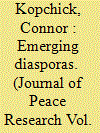

|
|
|
|
|
| Summary/Abstract |
An enormous number of people are leaving their homelands around the world today. This has happened several times in the past, but migration has spiked in recent years. These population movements can have significant effects on both the host country (where emigrants or refugees settle), as well as politics back in the homeland. After they leave their homelands, why do some groups mobilize, and in what ways? In this article, we examine a number of factors that may impact when emigrated groups mobilize after they move. We develop a new dataset on potential diasporas in the United States to evaluate a series of hypotheses, including those about motivations for mobilization such as identity maintenance, the objective plight of co-ethnics in the homeland, and group capacity to mobilize. We find some merit in the identity preservation argument and a strong effect of geographic concentration of the diaspora segment. Surprisingly, diaspora mobilization does not appear to be strongly related to conflict in the homeland among these groups.
|
|
|
|
|
|
|
|
|
|
|
|
|
|
|
|
| 6 |
ID:
184204
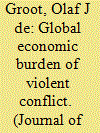

|
|
|
|
|
| Summary/Abstract |
Calculating the consequences of global public bads such as climate change or pandemics helps uncover the scale, distribution and structure of their economic burdens. As violent conflict affects billions of people worldwide, whether directly or indirectly, this article sets out to estimate its global macro-economic repercussions. Using a novel methodology that accounts for multiple dimensions of war, the article finds that, in the absence of violent conflict since 1970, the level of global GDP in 2014 would have been, on average, 12% higher. When disaggregating these results by conflict type, civil conflicts are estimated to have been the costliest by far. Income growth is found to be altered up to four years following the end of a conflict, although the direction of this relationship depends on the intensity and type of conflict. Countries also suffer significantly from fighting in neighbouring countries, thereby showing the importance of mitigating spillovers rapidly. The largest absolute losses associated with violence emanate from Asia, while many high-income economies are found to benefit economically from participating in conflicts on foreign soil. This analysis thus shows that, despite some evidence of a faster post-conflict growth and possible benefits for external participants, violent conflict leads to net global losses that linger long after peace is achieved, reducing the peace dividend. The article concludes by discussing public policy options to strengthen the benefits of peace as a global public good.
|
|
|
|
|
|
|
|
|
|
|
|
|
|
|
|
| 7 |
ID:
184201
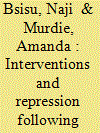

|
|
|
|
|
| Summary/Abstract |
Civil conflicts inevitably have negative consequences with regards to respect for human rights within affected states. Unfortunately, the violation of human rights often does not end with the conflict. What factors explain variation in state repression in post-civil conflict societies? Can international interventions, both civilian and military, improve human rights in states with a history of conflict? Does the size of the intervention matter? We argue that international interventions, including peacekeeping missions and officially directed foreign aid, can reduce physical integrity abuses. This process occurs by simultaneously increasing protections for civilians while also raising the costs of repression to both government leaders and their agents. Human rights abuses will also decrease when there are legal remedies available to vulnerable populations which are bolstered by a strong judicial system. A robust civil society can also discourage human rights abuses by shedding light on these events and providing human rights education. In line with our theoretical argument, we focus on UN peacekeeping missions, especially those with human rights teams, and officially directed foreign aid for legal and security sector reform and NGOs. Using both a treatment effects approach and a continuous dose–response model, we find much support for the implications of our argument.
|
|
|
|
|
|
|
|
|
|
|
|
|
|
|
|
| 8 |
ID:
184205


|
|
|
|
|
| Summary/Abstract |
The premier data on leader survival focus on the violent, dramatic means by which leaders ‘exit’ office. This information, vital for many research questions, constitutes a valuable public good for the community. Yet, it provides an incomplete picture of the political rise and fall of world leaders. The burgeoning study of leaders using survival analysis requires a fine-grained understanding of not just when, but why and how leaders lose power. We cannot, for example, conclude that a leader’s exit implies a successful application of international pressure if her removal stems from pre-set constitutional laws and the immediate successor has long been considered the heir apparent. The Regular Turnover Details dataset remedies this problem. Two principal variables report information about the manner of each leader’s exit and the relationship between outgoing and incoming leaders, allowing analysts to arbitrate between exits that suggest political failure and those that don’t, identify non-political leaders (such as interim and technocratic executives), and determine whether leaders constitute heirs to power or challengers thereto.
|
|
|
|
|
|
|
|
|
|
|
|
|
|
|
|
| 9 |
ID:
184195
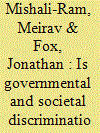

|
|
|
|
|
| Summary/Abstract |
This study asks whether governmental and societal discrimination against Muslim minorities explains the outflow of foreign fighters from non-Muslim-majority countries to Syria and Iraq. We use data from the ICSR, Soufan Group, Pokalova (2018), and RASM datasets to examine the connection between discrimination directed at Muslim minorities and the number of foreign fighters originating in a country. We apply grievance-based theory to examine whether minority-specific objective discrimination is behind the phenomenon. We find little evidence that discrimination increases the outflow of foreign fighters, but this outflow is higher from wealthier countries. The findings indicate that if grievances are a motivation for individuals to become foreign fighters, they are not connected to objective discrimination. This implies that at least some of the grievances relate to personal circumstances or that immigrant minorities are more likely to perceive inequality in wealthier countries.
|
|
|
|
|
|
|
|
|
|
|
|
|
|
|
|
| 10 |
ID:
184200
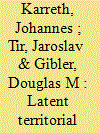

|
|
|
|
|
| Summary/Abstract |
Why do some democracies revert to non-democratic forms of governance? We develop an explanation of democratic reversals that emphasizes the influence of states’ external border relations on domestic politics. Latent threats to a state’s territory encourage political centralization of authority in the executive to defend against danger to the homeland. Latent territorial threat also facilitates the construction and maintenance of large land armies to fight threatening neighbors. Combined, latent territorial threat increases leaders’ domestic power, weakens democratic institutions, encourages other conditions threatening democratic survival, and, ultimately, leads to democratic reversals. Synthesizing prior research on territorial conflict, we generate a quantitative, continuous measure of latent territorial threat against all democracies with contiguous neighbors from 1946 to 2016, using Bayesian estimation. Empirical tests accounting for measurement uncertainty and other common determinants of reversals as well as brief reviews of individual cases of reversal provide robust evidence that democracy failed at higher rates in countries facing high levels of threats to their territory from neighbors. Our study implies that a complete account of the development of democratic institutions should emphasize that domestic factors alone fall short of explaining why democracies fail.
|
|
|
|
|
|
|
|
|
|
|
|
|
|
|
|
| 11 |
ID:
184203
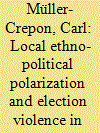

|
|
|
|
|
| Summary/Abstract |
How does local ethnic demography affect the conduct of majoritarian elections? Because legislative elections in majoritarian systems are contested locally, local ethno-political polarization increases the risk of pre-election violence. In districts that are polarized between politically competing ethnic groups, violence can be targeted with comparative ease at opposing voters, and can, if perpetrated collectively, mobilize the perpetrators’ co-ethnics. I do not expect such dynamics in PR systems where political competition plays out at higher geographical levels. To test this argument, I combine new data on the ethnic composition of local populations in 22 African countries with monthly data on riots and survey data on campaign violence. Ethno-politically polarized districts in majoritarian and mixed electoral systems see substantively larger increases in the number of riots prior to legislative elections and more fear of pre-election violence among citizens than non-polarized districts in the same country and at the same time. I do not find these patterns in PR systems. The results enhance our understanding of how electoral systems interact with local ethnic demography in shaping pre-election violence.
|
|
|
|
|
|
|
|
|
|
|
|
|
|
|
|
| 12 |
ID:
184196
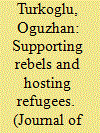

|
|
|
|
|
| Summary/Abstract |
Why do some countries host more refugees than others? Previous research has focused on the role of geographical, political, and economic determinants, and little attention has been paid to civil conflict dynamics. In this article, I examine how a host country’s support for rebel groups may affect the number of refugees that it accommodates. Countries that support rebels host a higher number of refugees than others, as accommodating refugees can be the continuation of that support and help rebel groups in their armed struggle. By hosting people, countries may offer a sanctuary from which rebels can operate some of their insurgent activities. Rebel groups can exploit these camps for recruitment, training, and benefiting from the main services such as health care. In addition, when rebels operate in host countries, these countries may monitor, impact, or even direct the strategies of insurgent groups. Analysis of refugee flows between 1968 and 2011 suggests that countries which support rebel groups host twice as many refugees as others. Results are robust to various model specifications, two different sources for the main explanatory variable, matching analysis, and additional checks. Findings of this article highlight the importance of conflict dynamics in explaining the variation in refugee flows
|
|
|
|
|
|
|
|
|
|
|
|
|
|
|
|
| 13 |
ID:
184206
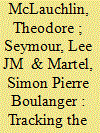

|
|
|
|
|
| Summary/Abstract |
Training other countries’ armed forces is a go-to foreign policy tool for the United States and other states. A growing literature explores the effects of military training, but researchers lack detailed data on training activities. To assess the origins and consequences of military training, as well as changing patterns over time, this project provides a new, global dataset of US foreign military training. This article describes the scope of the data along with the variables collected, coding procedures, and spatial and temporal patterns. We demonstrate the added value of the data in their much greater coverage of training activities, showing differences from both existing datasets and aggregate foreign military aid data. Reanalyzing prior research findings linking US foreign military training to the risk of coups d’état in recipient states, we find that this effect is limited to a single US program representing a small fraction of overall US training activities. The data show comprehensively how the United States attempts to influence partner military forces in a wide variety of ways and suggest new avenues of research.
|
|
|
|
|
|
|
|
|
|
|
|
|
|
|
|
|
|
|
|
|